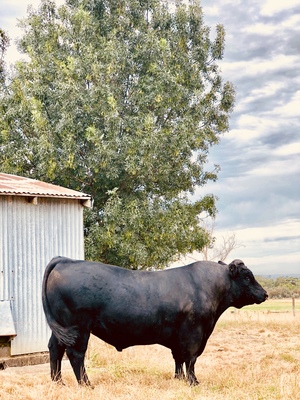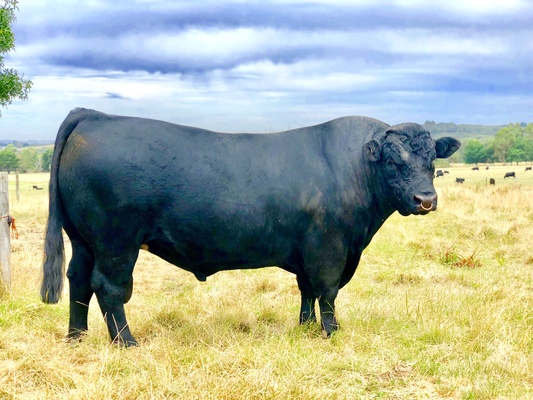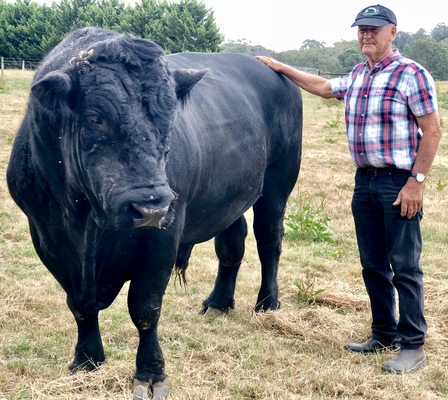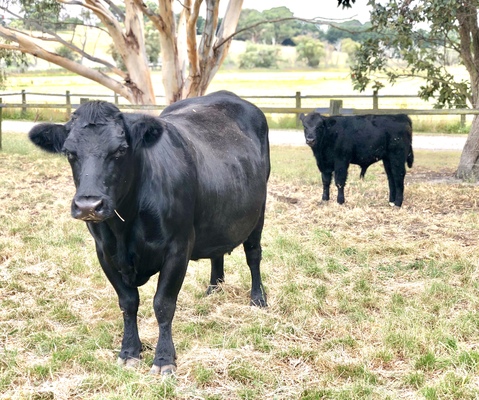ON THE LAND
In what began as hobby farm in Tynong North has turned into the most successful Buchanan Park Welsh Black Cattle Stud in Australia for Allan and Jill Furborough, as BRENDAN REES discovered.
“You’re better to try and fail, than not to try at all – that’s how I’ve always seen things. Life doesn’t stand still and you’ve got to be forward thinking all the time to keep up or maybe keep ahead.”
Allan Furborough has a gleam of excitement in his eye as he walks over to a large jarrah farm shed, and rolls the door open.
He grabs a handful of hay from a large haystack inside and lays it in the palms of his hands.
“It’s a green as anything still and smells absolutely beautiful. It’s got a really sweet edible smell,” he says.
“I’ve heard old time farmers say ‘If it smells that good you could smoke it.’”
“We’ve had grass like we’ve never had before,” he explains. “We finished three days ago give or take cutting hay.”
The pastures at Buchanan Park Welsh Black Cattle Stud property in Tynong North, where Allan and his wife Jill run about 100 cattle, were cut for silage last November but after closing the paddocks again “they grew like mad.”
“We’ve never had hay of such high quality off some of the paddocks. It was 90 per cent clover; from a farming point of view it looks magnificent,” Allan says.
Lucky not to have been affected by the drought, the couple say: “We do feel for other people in other areas, it’s not something you take lightly.”
The farm is sprawled across 130 acres of open land with the edges flanked by eucalypt trees. Buchanan Park has been successful over the past 19 years breeding many Welsh Black champions both females and bulls – winning prizes at Victorian agricultural shows, every year without fail.
“Initially when we started showing cattle we were only go to show one or two but after a while it grew and grew,” Allan says. “In the end at times we were taking 10 and 12 to shows.”
Allan is wearing a checked shirt, black jeans, and a black cap with their stud farm logo on it. He says the cattle can be trained by demand which they have been doing for years. “It’s just repetitive: If you’re kind to them they will respond. When I say kind you’ve got to be definite and firm – firm but fair.”
“Now, we’ve come back and we take three or four…every year we have new cattle to show,” Allan says.
The couple were successful at Lang Lang Show held last weekend, again winning best pair of heifers with Mollie and Natasha. They also won best group of three with Lincoln, Mollie, and Natasha.
“A fantastic result for us – two shows in a row winning these two big classes. Lincoln, a 3-year-old bull, was also Senior Reserve Champion,“ Jill said.
Their first show was the Royal Melbourne Show in 2002 where they were successful with two firsts and junior reserve champion bull, won by Buchanan Park Douglass.
Last November they took out first prize at the Dandenong Show for the best pair of females, and group of three (a bull and two heifers).
Their “biggest success” came at the National Beef Show in Bendigo in 2013 where they won the supreme exhibit and the group of three. “That really put us and the Welsh Black breed on the map big time because there were around 450 cattle exhibited there,” Jill says.
“We do pride ourselves in the way we present out cattle, and I think a lot of people would acknowledge that over the years.”
“When we had other breeds, early days,” Allan says, “the Welsh Blacks would be out in the paddock grazing and the other cattle would be standing behind the plantations cold…The other breeds would lose weight quickly whereas the Welsh Blacks didn’t.
“What we like about them is their temperament.”
Welsh Blacks are docile and really easy to handle, the couple say. “Even the ones that are not trained, when you get them in the yards they’re not a threat to you,” Allan says.
“They are a pleasure to work with,” Jill says, leaning against a fence post while two cows drink water from a concrete trough nearby.
“We don’t find much stresses them at all. We sell quite a few bulls to commercial people,” Allan says.
The couple’s farm is the most successful Welsh Black stud in Australia. When asked what the secret is to their achievement Jill says “hard work.”
“No animal is really perfect but what you do is look for the fault of that animal and you try and use a bull that will correct that fault,” Allan responds. “We’ve been very fortunate that we’ve had a lot of success, and very few failures.”
Genetics is a funny game, Jill adds. “Some people have got the knack of getting the genetics right to breed good animals, and I guess Allan and I have been fortunate.”
Allan speaks of their cattle with passion: “You’re better to try and fail, than not to try at all – that’s how I’ve always seen things. Life doesn’t stand still and you’ve got to be forward thinking all the time to keep up or maybe keep ahead.”
Allan’s hands are hard with broad fingers. His skin dark brown, and despite being in his mid-seventies he still works every morning in the paddocks with the help of Jill. “I’m fairly fit, but I am slowing down a bit, I am noticing it,” he says.
The couple were in market gardening at a property in Berwick, before marrying and having three girls, Karen, Maree and Julie. “I’d worked very hard. I think I needed to take a breather,” Allan says.
Asked what they have love most about Welsh Blacks, which began as a hobby farm, Jill says “the success I guess.”
“For us this has been our mid-life crisis as we called it at the time and something we’ve worked together and enjoyed doing together.
“We don’t play golf; we don’t play tennis because there’s no time for that. For us, our cows are our second life really,” she says.
Allan walks over to a farm shed before reaching for the ignition of a red four-wheel-drive buggy and roars the machine to life. He winds his way up a gravel track to some nearby paddocks, passing a few old bath troughs, and cattle grazing under a nearby a eucalypt tree.
It’s a humid afternoon summer’s day. “You can see the grass. It was beautiful and green last week; it’s dried out,” he says.
Allan makes his way into paddock; a pair of earmuffs dangling above his head in the buggy bounce around over the uneven surface.
The rumble of the mechanical invasion draws the curiosity of a herd of Welsh Black cattle, where a large bull begins to moan and kick some dirt. He cuts the engine and jumps out.
“A quick whizz around to see that everybody is standing and there’s no one looking unwell,“ Allan says.
In another paddock stands King Kong, a six-year-old former show bull whose weight was a staggering 1,300 kilograms in his prime.
“He was quite successful,” Allan says. “They sort of get to a certain age where you don’t show them anymore. He is like a ballet dancer, very light on his feet.”
“You’re a good boy aren’t you? Allan says, patting him on the back. “If he puts his head down, he wants a scratch.”
As for their plans this year, Allan and Jill say they will continue to support local shows. “That’s important for the community so the shows keep going,” Jill says.
And despite their long list of accolades, the couple say it’s the friendships they’ve made that has been most satisfying.
“We’ve met some really nice friends throughout our showing life,” Jill says. “They are long-life friends. You’re competitive when you go in the ring but after that we can sit together and have a coffee.
“I think that’s what makes it more enjoyable for us as you get older.”












